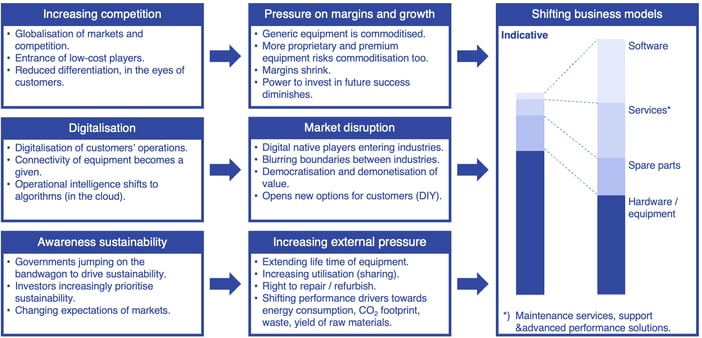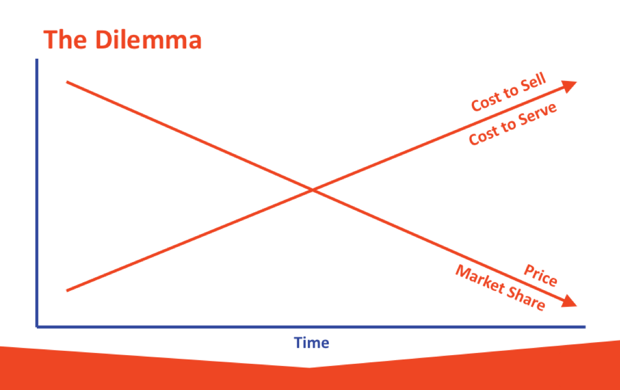9 Price Sensitivity Drivers
We must examine the price sensitivity of your services and solutions in specific market segments when developing the proper revenue and pricing...
5 min read
Jan van Veen
Jun 19, 2023 12:39:11 PM

In the ever-evolving landscape of manufacturing industries, companies are navigating through a service transformation journey driven by global competition, digital disruption, and sustainability imperatives.
To thrive in this new era, manufacturers are recognizing the vital importance of monetising their advanced services. By shifting their value proposition and business models, they can unlock untapped revenue streams and create a sustainable competitive advantage.
In today's dynamic business environment, manufacturing industries are experiencing a significant shift in their landscape. Three key factors are driving this transformation:

Firstly, global competition has intensified, with companies vying for market share on a global scale. Manufacturers are no longer competing solely with local players; they are facing competition from companies across borders, challenging them to differentiate themselves and deliver unique value to customers. This heightened competition necessitates a fresh approach to business strategies and service offerings.
Secondly, the advent of digital transformation has revolutionized the manufacturing sector. Rapid advancements in technology, such as the Internet of Things (IoT), artificial intelligence, and big data analytics, have enabled manufacturers to gather and leverage vast amounts of data. This data-driven approach enhances operational efficiency, improves decision-making, and opens doors to new business models and revenue opportunities.
Furthermore, sustainability and circular industries have gained immense importance. As societies and governments prioritize environmental conservation, manufacturers are compelled to adopt sustainable practices, reduce waste, and transition towards circular business models. This shift demands innovative thinking, eco-friendly processes, and the ability to develop products and services that align with circular economy principles.
To thrive in this evolving landscape, manufacturers must embrace change and adapt their strategies accordingly. The traditional focus on product-centric approaches is no longer sufficient. Manufacturers need to recognize the significance of services and the value they bring to customers.
As commoditization encroaches on equipment markets and product-related maintenance services, service offerings become a critical differentiator.
Manufacturers must reposition themselves as providers of advanced services, offering holistic solutions that address customers' evolving needs.
By integrating advanced technologies, predictive maintenance, and value-added services, manufacturers can offer improved customer experiences, optimize operations, and unlock new revenue streams.
Service transformation offers several benefits and opportunities for manufacturers
Firstly, it enables them to generate additional revenue streams. By monetizing advanced services, manufacturers can tap into new sources of recurring revenue, enhancing their financial stability and profitability. Moreover, service-centric approaches provide opportunities for upselling and cross-selling, as manufacturers can offer supplementary services and tailored solutions that meet specific customer needs.
Additionally, service transformation allows manufacturers to differentiate themselves from competitors. In a crowded marketplace, where products can easily be commoditized, it is the comprehensive service offerings and exceptional customer experiences that set manufacturers apart. By focusing on service excellence, manufacturers can build a strong reputation, increase customer loyalty, and create a sustainable competitive advantage.
Service transformation also drives innovation within manufacturing companies. As manufacturers expand their service offerings, they must continually innovate to meet changing customer expectations and leverage advancements in technology. This innovation mindset leads to the development of new service concepts, the integration of emerging technologies, and the optimization of operational processes.
The criticality of monetising services cannot be overstated. Without advancing the capability to effectively monetise services, companies will struggle to succeed with their new service offerings and service transformation initiatives. It is through monetisation that companies are able to generate the necessary revenue streams to support their service-centric business models.
Failing to monetise services can have detrimental effects on a company's financial health. Without sufficient revenue streams from their advanced services, companies may experience a decline in margins and profitability. This can ultimately impact their return on investment (ROI) and hinder the overall success of their service transformation efforts.
Furthermore, selling advanced services requires a different approach compared to traditional product-related services. It involves articulating and demonstrating the unique value proposition and benefits that these advanced services bring to customers. The selling process becomes more complex as it involves addressing specific operational and business needs rather than simply focusing on the condition of the equipment.

Achieving success in service transformation requires manufacturers to overcome various barriers and adopt strategies that propel them towards their goals. By establishing a winning service strategy, developing an adequate service portfolio, building internal capabilities, fostering a service-centric culture, and embracing technology and data analytics, manufacturers can drive the transformation and unlock the full potential of their advanced services.

By actively addressing these barriers and implementing the strategies outlined above, manufacturers can drive success in their service transformation journey. Embracing a winning service strategy, developing a diverse service portfolio, building internal capabilities, fostering a service-centric culture, and leveraging technology and data analytics will enable manufacturers to differentiate themselves, capture new revenue streams, and thrive in the dynamic landscape of advanced services.
In conclusion, the monetisation of advanced services is of utmost importance for manufacturers seeking to thrive in the evolving business landscape. By embracing this transformation, manufacturers can unlock new revenue streams, diversify their offerings, and achieve sustainable growth.
It is crucial for manufacturers to establish a winning service strategy, build a service-centric culture, and leverage technology to enhance their service offerings. I encourage readers to take action by implementing these strategies and exploring the opportunities presented by monetising advanced services.
For further learning and networking, don't miss the upcoming Service Transformation Summit, where industry experts will delve deeper into these topics and share valuable insights. Join us to be at the forefront of service transformation and drive success in your manufacturing business.
Other articles you may also be interested in:
Subscribe for the our Impulse Letter
With regular updates about service news, trends and best practices.

We must examine the price sensitivity of your services and solutions in specific market segments when developing the proper revenue and pricing...

Monetising advanced services is a mission-critical capability for a successful service transformation. After all, we are all on an exciting journey...

Too often we see that (new) services, solutions or features are promoted without connecting the dots to their bigger problems.